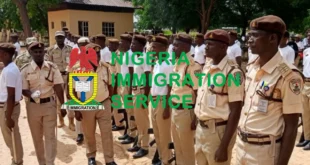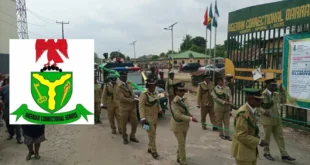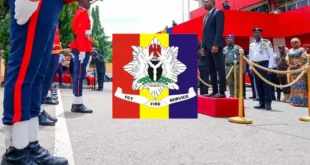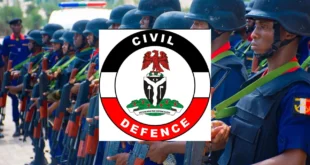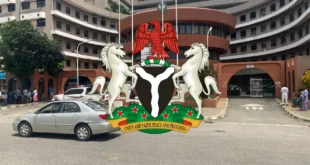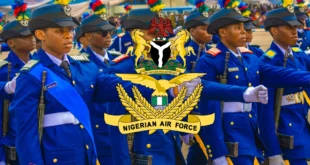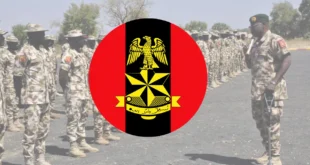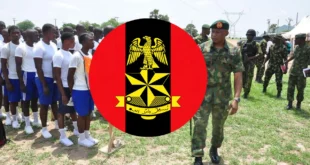The Nigeria Immigration Service (NIS) has officially announced the commencement of its 2025 recruitment exercise as part of the Civil Defence, Correctional, Fire and Immigration Services Board (CDCFIB) nationwide recruitment. This is the information you need to successfully apply for the Nigeria Immigration Service recruitment 2025. Available Positions and Career …
Read More »Nigerian Correctional Service Recruitment 2025/2026 Application Form Portal
The Nigerian Correctional Service has officially opened its 2025 recruitment portal, calling on suitably qualified Nigerians to apply for various vacant positions. We will state everything you need to know about the Nigerian Correctional Service recruitment 2025, including eligibility criteria, application procedures, and important deadlines. The Nigerian Correctional Service, formerly …
Read More »Federal Fire Service Recruitment 2025/2026 Application Form Portal | www.fedfire.gov.ng
Federal Fire Service Recruitment 2025 portal and how to apply on www.cdcfib.gov.ng. This article will provide information on Federal Fire Service recruitment portal 2025, application requirements, starting date for the recruitment and deadline including the details on the Federal Fire Service recruitment form and how to apply. The FFS recruitment …
Read More »Civil Defence Recruitment 2025/2026 – Apply on CDCFIB Portal
Civil Defence Recruitment 2025/2026 has now officially started on CDCFIB Portal www.cdcfib.gov.ng. NSCDC recruitment form 2025 is available online on the Civil Defence Portal so if you want to apply now, read the procedures on this page. Civil Defence job recruitment is open to all Nigerians graduates and non-graduates into …
Read More »FCSC Shortlisted Candidates 2025/2026 Full List
FCSC Shortlisted Candidates 2025 – You can check Federal Civil Service Commission Shortlisted Names of candidates 2025 on www.recruitment.fedcivilservice.gov.ng. FCSC Shortlist 2025 is out and you can download the FCSC PDF shortlist on the recruitment portal. If you want to find out how to check your name on FCSC Shortlist …
Read More »Nigerian Air Force Recruitment 2025/2026 Application Portal Form | www.nafrecruitment.airforce.mil.ng
Apply for Nigerian Air Force Recruitment 2025 on Nafrecruitment.airforce.mil.ng application portal. Nigerian Airforce Recruitment form 2025 is officially out on NAF recruitment portal. This article has listed out the requirements, link to apply and steps to apply on the Nigerian Airforce 2025 Recruitment Portal. The Nigerian Air Force (NAF) has …
Read More »Nigerian Army Recruitment 2025/2026 Application Portal Form | www.recruitment.army.mil.ng
Nigerian Army Recruitment 2025 is about to commence on www.recruitment.army.mil.ng portal. Many Nigerians are waiting for the Nigerian army form to be out so they can login to the Army recruitment portal 2025 begin the registration. The official portal for this application is www.recruitment.army.mil.ng. This is where interested applicants will …
Read More »Nigerian Army Shortlisted Candidates 2025/2026 | Check Army Shortlist Names PDF
Check Nigerian Army Shortlisted Candidates 2025 list on the official portal www.recruitment.army.mil.ng. The full list of Nigerian army shortlisted names PDF has been uploaded here for all candidates to check and prepare for the screening. Nigerian Army has announced that all candidates who applied for the Nigerian Army Recruitment 2025 …
Read More »NAFDAC Recruitment 2025/2026 Application Form Portal | www.nafdac.gov.ng
NAFDAC Recruitment 2025 portal and how to apply on www.nafdac.gov.ng. This article will provide information on NAFDAC recruitment portal 2025, application requirements, starting date for the recruitment and deadline including the details on the NAFDAC recruitment form and how to apply. The National Agency for Food and Drug Administration and Control …
Read More »NITDA Recruitment 2025/2026 Application Form Portal | www.nitda.gov.ng
NITDA Recruitment 2025 portal and how to apply on www.nitda.gov.ng. This article will provide information on NITDA recruitment portal 2025, application requirements, starting date for the recruitment and deadline including the details on the NITDA recruitment form and how to apply. The National Information Technology Development Agency recruitment 2025 will …
Read More » SOSAN.ORG.NG Latest Recruitment and Jobs in Nigeria
SOSAN.ORG.NG Latest Recruitment and Jobs in Nigeria
